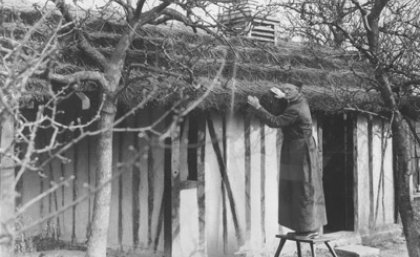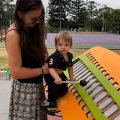
A Caboolture collection of curios and spiritual artefacts gathered by an eccentric British Freemason will go on show this weekend, and is featured in a new history book.
The book, published by Sussex Academic Press in the UK, details the life of Father John Ward, considered a “forgotten pioneer of Britain's first museum of social history”.
Archangels & Archaeology: J.S.M. Ward’s Kingdom of the Wise tells a story of Freemasonry, spiritualism, and esoteric religion and examines Ward’s collection of artworks, ancient pottery, weapons, tools, jewellery and religious artefacts of all kinds.
Author Dr Geoff Ginn, lecturer in British history and heritage studies at The University of Queensland, says the book tells an “extraordinary” tale of the times through Ward’s remarkable collection.
“The story explains the cultural turmoil and religious diversity of English life in the 1920s and 1930s but there is a very human side to it too”,” said Dr Ginn.
Though he never came to Queensland, Ward’s collection was shipped overseas by his spiritual followers and is now housed at the Abbey Museum in Caboolture. Highlights from the collection will go on show at this weekend’s Abbey Medieval Festival.
Ward’s initial museum, the Abbey Folk Park on the outskirts of London opened in 1934 and closed at the start of the Blitz in 1940. It was one of the first historical theme parks, showing the past in a more lively and democratic way than traditional museums.
Ward tried to preserve the traditional heritage of England that was rapidly disappearing in the wake of industrialisation and change. By 1940 he had amassed over 90,000 items and salvaged some 30 significant historical buildings from demolition. Such pieces revealed the history of world civilisations to thousands of visitors, but Ward’s Folk Park has since been largely forgotten by historians.
Dr Ginn’s book also reveals how Ward cultivated his own religious community in London from 1929, called the Confraternity of the Kingdom of Christ to announce messages of a Christian apocalypse and a return of Jesus Christ.
“This is an extraordinary story, and it was a great challenge drawing all the loose threads together,” said Dr Ginn.
“For all his eccentricities, Ward was a great idealist and a brilliant communicator. In many ways he was an inspirational teacher.”
Ward was an enthusiastic Freemason and part of the Spiritualist revival that accompanied the carnage and grief of World War I. His spiritual views were also shaped by his time in Burma as a schoolteacher, where he absorbed ideas of karma and reincarnation.
Central to his decision to leave England was a sensational court case in May 1945, which Dr Ginn argues disgraced him unfairly and sent him into self-imposed exile.
“Social life in wartime England was dour and austere. Ward’s mysticism and his idealistic community were both viewed with suspicion,” he said.
Following Ward’s death in 1949, his confraternity travelled to Australia via Cyprus and Sri Lanka, and in 1965 moved permanently to Caboolture in southeast Queensland.
In 1978 a decision was made to resurrect the Abbey Museum and make the remaining collections available to the public.
Medieval manuscripts and stained glass retrieved from the collection are still able to be viewed today, at events like the Abbey Museum’s annual Medieval Festival and Tournament in Caboolture.
Archangels & Archaeology: J.S.M. Ward’s Kingdom of the Wise is distributed in Australia by Eleanor Brasch Enterprises and Australian Book Group.
History enthusiasts can view some of the collection at the Abbey Medieval Festival during Saturday 7th and Sunday 8th of July 2012. For more information, please visit: http://abbeytournament.com
MEDIA: Dr Geoff Ginn (07 3365 6407 or email g.ginn@uq.edu.au)
.jpg)









